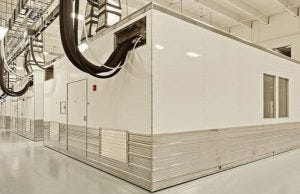Content Spotlight
Podcast: MilliporeSigma says education vital to creating unbreakable chain for sustainability
MilliporeSigma discusses the importance of people, education, and the benefits of embracing discomfort to bolster sustainability efforts.

Pall’s continuous bioprocessing technologies will be incorporated into G-CON’s prefabricated ‘POD’ cleanroom units in efforts to address current capacity constraint, CAPEX deferment, and cost predictability.
G-CON’s PODs are mobile cleanroom units, which include integrated process piping and heating and air conditioning (HVAC) system. A collaboration with bioprocessing vendor Pall Biotech will bring its continuous bioprocessing and viral vector production designs, including automation and utility supplies, to the units.
The partnership sets out to solve three needs: contract development and manufacturing organization (CDMO) capacity constraints, CAPEX deferment, and cost predictability, according to Mario Philips, vice president & general manager at Pall Biotech.

G-CON will predesign Pall bioprocessing tech into its POD mobile cleanroom units. Image c/o G-CON
“The recent spike in virtual biotechs and companies choosing to outsource process development and manufacturing created a significant demand surplus,” he told BioProcess Insider.
“Capacity constraints at leading CDMOs is a current bottleneck given that demand outstrips supply, leaving customers with two options: One, wait for a run slot or, two, invest in building a facility. For many, especially early-stage companies, creating a full-scale GMP facility early in the drug development stage is economically infeasible.”
Therefore, the G-CON collaboration aims to offer customers the freedom to defer CAPEX and better predict future investments, he continued.
“Given the autonomous nature of a Pall equipped G-CON PODs, customers have the option to either invest in small-scale upstream/downstream PODs or take a piecemeal approach by purchasing a few PODs that meet their current needs and budget.
“As their drug development progresses into clinical trials, more PODs can be connected to their existing infrastructure, meeting future manufacturing demands. Additionally, once a POD is designed and manufactured to meet customer needs, the same design is then replicated as the customer scales, keeping the cost structure stable throughout the drug’s lifecycle.”
Pall is the latest vendor to show interest in modular and prefabricated biomanufacturing facilities. GE Healthcare’s KUBio platform is an off-the-shelf biomanufacturing facility the firms says can be assembled and fitted-out to current Good Manufacturing Practices (cGMP) standards in half the time of traditional plants.
However, Philips told us there tends to be some market misconception around modular/prefabricated facilities.
“The two overarching customer needs are speed to market and flexibility, and current facility architecture and designs are quickly becoming obsolete. Legacy facilities designed for single products or platforms are not enough for today’s emerging therapeutics.
A traditional brick and mortal facility, he continued, has limited flexibility due to being a permanent building fixture with a centralized HVAC system, while current modular pre-fabricated facilities are built off-site and assembled at a designated location that also becomes a permanent facility with a central HVAC system.
“Customers require flexibility because, in areas such as gene therapy, demand for a commercialized therapeutic spike when it’s first released and levels out as it cures the target population. The demand decrease creates a significant problem for the company because both modular and brick & mortar facilities are inflexible given they were built to support the original demand and product. This results in the facility overhead cost turning into a liability.”
Up to this point, traditional and modular facilities have not been able to solve both dilemmas, he added. “Traditional facilities fail at both speed to market and flexibility, while prefabricated solutions with centralized HVAC system only address speed to market.”
Therefore, the G-CON and Pall collaboration sets out to solve both needs.
“A modular POD, unlike prefabricated facilities, is a self-contained, fault-tolerant GMP complaint system. Each POD comes pre-installed with its own HVAC system. Such a design not only compresses the project timeline but gives customers the flexibility to re-purpose and deploy each POD to a new therapeutic as the original demand fades out.
“Additionally, a G-CON POD equipped with Pall’s continuous technology makes the overall footprint of G-CON PODs smaller, faster to deploy, and drives down the cost.”
You May Also Like